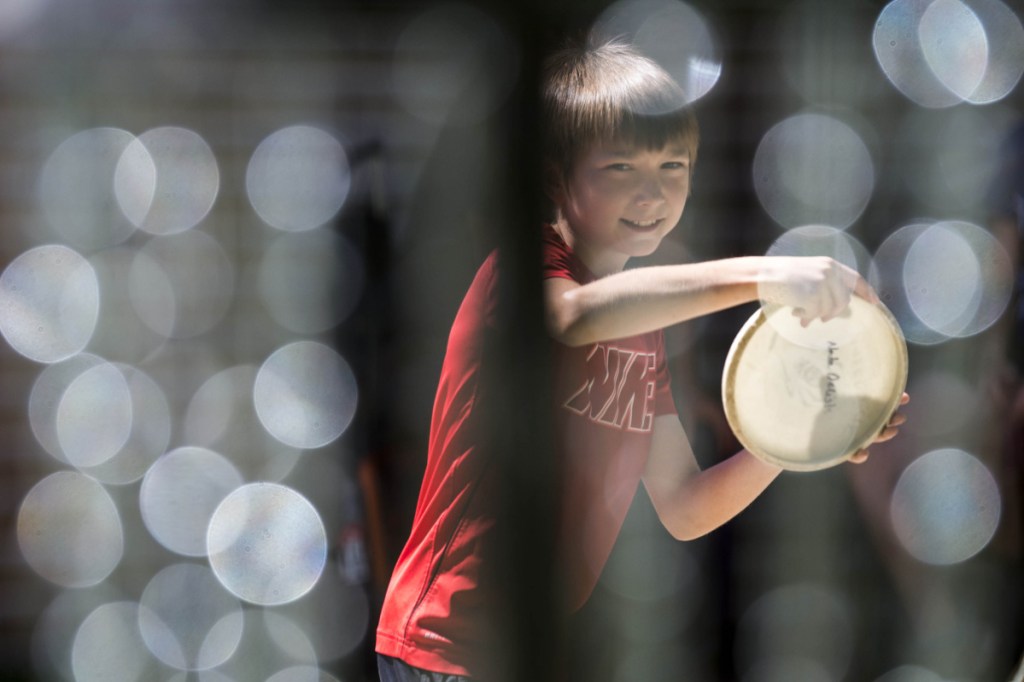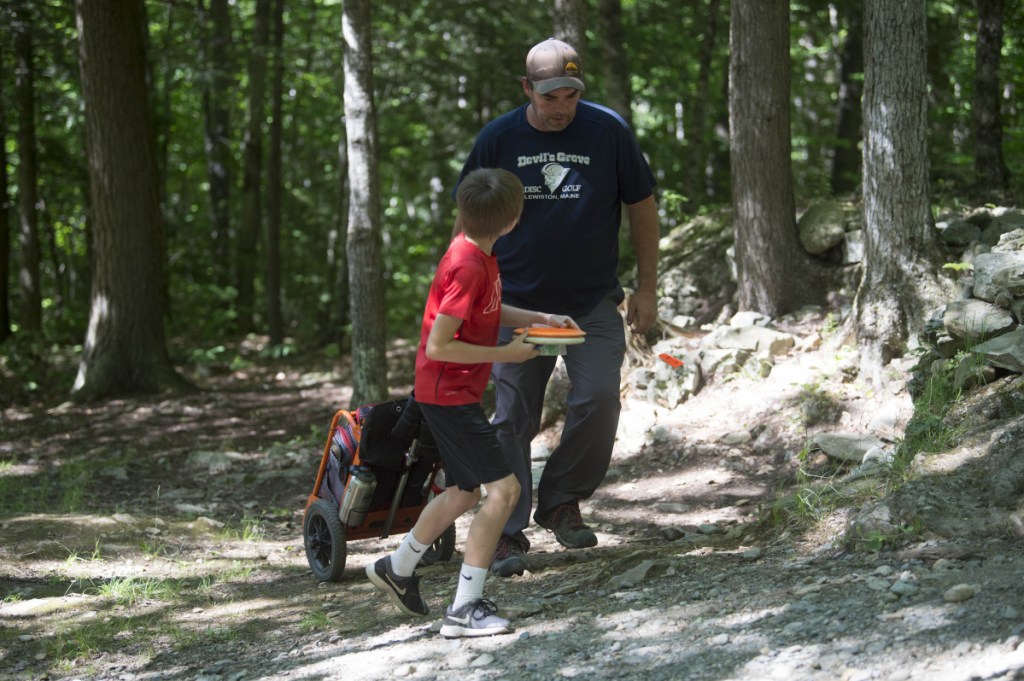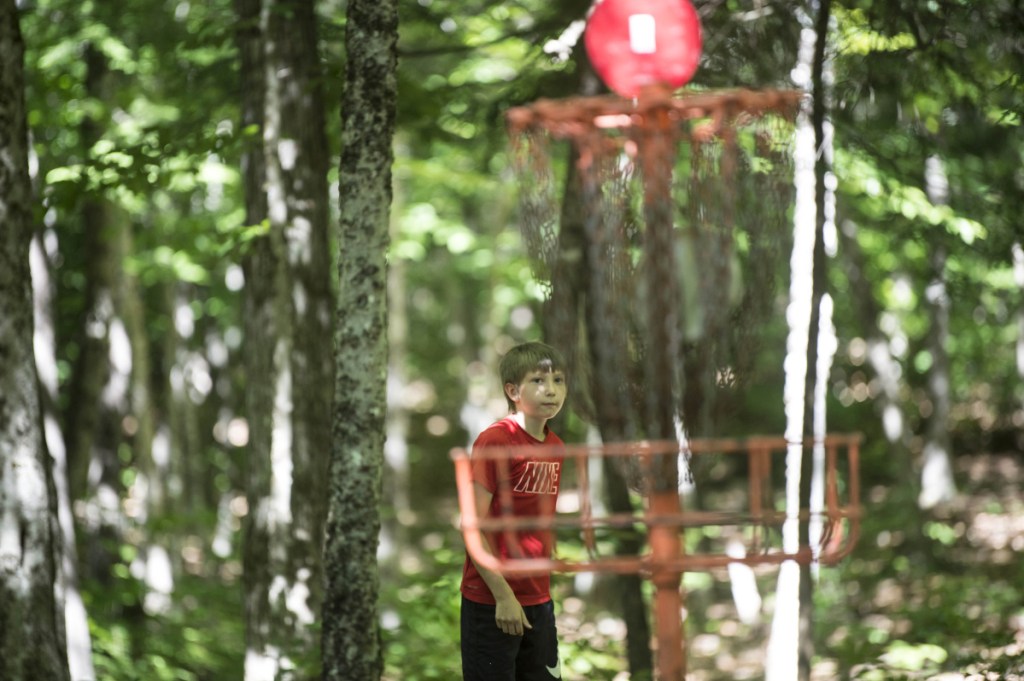VASSALBORO — Bobby Harris remembers when disc golf was still a curiosity, and more of an activity than a sport. And according to the Lewiston resident, it wasn’t that long ago.
“I’ve been playing for 20 years, and probably since 2005, it has almost doubled every year,” he said. “It’s only getting bigger and better every year.”
It’s becoming more popular, and it’s becoming more serious. There are now over 60 courses in Maine. They have tournaments every weekend, drawing players from throughout the state. And there are even two playing circuits within the state, the Maine Players Tour and the Maine Disc Golf Tour, the latter of which has started selling out events with 90-100 players showing up each weekend.
The game has progressed, and so have the players. While disc golf still caters to the recreational player looking for a fun afternoon outdoors, more competitive players have emerged, with sponsorships and professional status a possibility for those who make the sport less of a hobby and more of a life pursuit.
Harris is one of those professionals. He’s played an estimated 300 rounds a year, all over the country, for the past eight years. And he’s not alone. Traveling far and wide for tournaments is becoming less of an anomaly with each passing year.
“It’s definitely growing, and you notice there are a lot more pros nowadays,” said Alley Burns, the director of sales at the Burnsboro Disc Golf course in Vassalboro, whose boyfriend, Tyler Grady, is a pro sponsored by Discraft. “There used to just be amateur players, playing for fun. Now people are making money off the sport.”
On Saturday, 28 players showed up at Burnsboro for a qualifying event for the Next Gen Tour (NGT), a circuit geared toward getting more players into the sport. It was an amateur event, resulting in the reduced amount of players, but there was still serious incentive. Winning the Gladiator division, the most advanced of the three skill categories, meant a waived entry fee for the NGT regionals in Pennsylvania.
According to Harris, the game’s accessibility makes it easy for players to first get into the sport, and then to play it enough to excel. Courses offer league competition during the weeks that is open to anyone who wants to play, and with most of them charging less than $10 a round, the sport is a bargain.
“There’s a lack of activities that everybody and anybody can do, regardless of gender or age,” Harris said. “We have kids 4 and 5 years old out here, throwing competitively even, all the way up to the owner of Troll Valley (in Farmington) is in his mid 80s and still plays. Man or woman, child or adult, anybody can play the game. And it’s very inexpensive.”
Saturday’s event gave an example. One of the players at the front of the Saints division was Poland’s Nate DeLisle, who at 11 years old was the youngest player competing. DeLisle,who had the ineligible Harris caddying for him, picked up the sport last year and progressed quickly, finishing second in the Junior IV Boys division at the Junior Disc Golf World Championships in Quad Cities, Iowa last year.
“You have to have the mental game,” said DeLisle, who practices every day on a course in his yard. “You can’t get mad when you take high scores.”
Waldo’s Jess Beckett, another competitor Saturday, will be going to the Amateur World Championships in Charlotte this month.
“I think it’s just becoming very versatile,” she said. “It is inexpensive, in a way, and there are a lot of pro shops. You can rent discs, you can go out and try it. You don’t have to spend a lot of money. But if you do, it’s just like any other sport. You can really put the time and effort in and get the best gear.”
Harris said he’s seeing that growth in popularity kicking in particularly strongly in Maine, which can keep its courses well-maintained since most of them are on private property.
“The owners here are gracious enough to give us their land to use for a small fee, and they keep it beautiful,” he said. “Most other places are state parks. … Pay to play is a huge advantage, and probably has a lot to do with our growth up here in Maine.”
He doesn’t see that growth slowing down.
“I think it’s definitely here to stay,” he said. “It’s not going backwards at all. Probably within the next few years it’ll be more collegiate and in the high schools. … The biggest thing I hear is ‘Oh, I’d play that, I’m just not that good.’ So go out there and play some more. That’s all it takes.”
Drew Bonifant — 621-5638
dbonifant@centralmaine.com
Twitter: @dbonifantMTM
Copy the Story LinkSend questions/comments to the editors.






Success. Please wait for the page to reload. If the page does not reload within 5 seconds, please refresh the page.
Enter your email and password to access comments.
Hi, to comment on stories you must . This profile is in addition to your subscription and website login.
Already have a commenting profile? .
Invalid username/password.
Please check your email to confirm and complete your registration.
Only subscribers are eligible to post comments. Please subscribe or login first for digital access. Here’s why.
Use the form below to reset your password. When you've submitted your account email, we will send an email with a reset code.